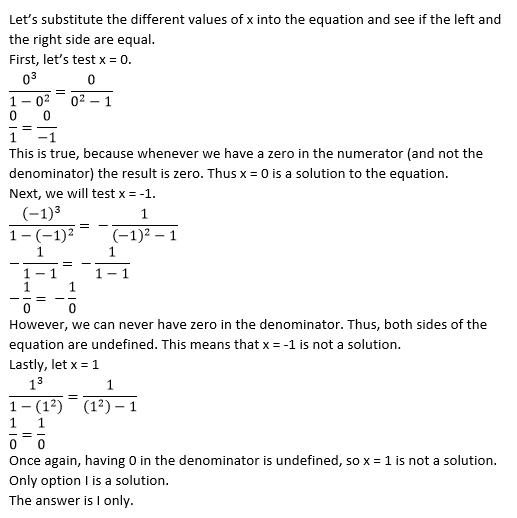How to find out when an equation has no solution
Help Questions
GRE Quantitative Reasoning › How to find out when an equation has no solution
Quantity A:
Quantity B: 11
Quantity B is greater
Quantity A is greater
The two quantities are equal.
The relationship cannot be determined.
Explanation
Expand 

Since 

There is no solution
3
–3
1
–1/2
Explanation
Solve:
No Solution
Infinitely Many Solutions
Explanation
First, distribute the 
Add 6x to both sides.
This is false for any value of 
The sum of two integers is 

Explanation
Let us write down what we are told in mathematical terms, designating the smaller integer as 

The sum of the two integers is 
And the larger integer is 
Writing the first equation in terms of 
Which allows us to find 
Thus, the positive difference between the two is found as
Solve 
No solutions
Explanation
By definition, the absolute value of an expression can never be less than 0. Therefore, there are no solutions to the above expression.
Quantity A:
Quantity B:
Quantity A is greater.
Quantity B is greater.
The two quantities are equal.
The relationship cannot be determined from the information given.
Explanation
We are given that y = 32. Plug this value of y into the second equation.
32 = x2 – 4
36 = x2
x = +/– 6.
Next find a value for Quantity A:
y/7 = 32/7
This number is less than +6, but more than –6. Thus, the relationship cannot be determined from the information given.
Quantity A:
Quantity B:
Quantity A is greater.
Quantity B is greater.
The two quantities are the same.
The relationship cannot be determined.
Explanation
To solve this problem, expand each function described by Quantities A and B:
Quantity A:
Quantity B:
Now note that Quantities A and B only differ in that Quantity A is greater by 
Since we are told that 


Find the solution to the following equation if x = 3:
y = (4x2 - 2)/(9 - x2)
0
6
3
no possible solution
Explanation
Substituting 3 in for x, you will get 0 in the denominator of the fraction. It is not possible to have 0 be the denominator for a fraction so there is no possible solution to this equation.
None of the other answers
Explanation
A fraction is considered undefined when the denominator equals 0. Set the denominator equal to zero and solve for the variable.
I. x = 0
II. x = –1
III. x = 1
I only
II only
III only
II and III only
I, II, and III

















































